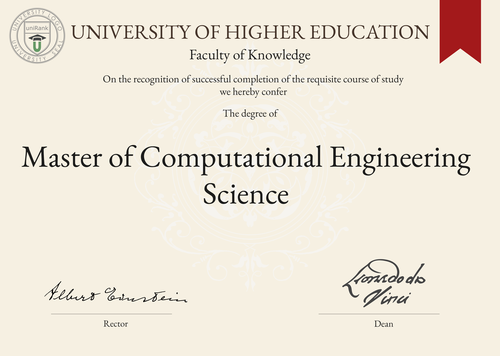
Master of Computational Engineering Science (M.C.E.S.)
Guide to Master of Computational Engineering Science Program/Course/Degree
Master of Computational Engineering Science (M.C.E.S.)

Program Name:
Master of Computational Engineering ScienceProgram or Degree abbreviation:
M.C.E.S.Duration range:
The duration of the program typically ranges from 1 to 2 years.Tuition range:
The tuition fees for the program vary depending on the chosen country and university. Please refer to the respective university websites for specific information.Overview:
The Master of Computational Engineering Science program is designed to provide students with a comprehensive understanding of computational methods and their applications in engineering and scientific fields. It combines theoretical knowledge with practical skills to equip graduates with the ability to solve complex engineering problems using computational techniques.Curriculum Overview by year:
- Year 1: Introduction to Computational Engineering, Numerical Methods, Programming for Engineers, Applied Mathematics, Engineering Analysis - Year 2: Advanced Computational Techniques, Simulation and Modeling, Optimization Methods, Elective Courses, Research ProjectKey Components:
- Computational Methods: Students will learn various computational methods and algorithms used in engineering and scientific research. - Programming Skills: The program emphasizes the development of programming skills to implement computational solutions. - Applied Mathematics: Students will gain a strong foundation in applied mathematics to support their computational analysis. - Research Project: A research project allows students to apply their knowledge and skills to real-world engineering problems.Career Prospects:
Graduates of the Master of Computational Engineering Science program can pursue careers in various industries, including aerospace, automotive, energy, finance and healthcare. They can work as computational engineers, data analysts, research scientists, software developers, or consultants.Salary Expectations:
The salary expectations for graduates of the program can vary depending on factors such as location, industry and level of experience. Generally, computational engineers earn competitive salaries, with the potential for high earning potential as they gain more experience and expertise. For a more accurate understanding of salary expectations, you can utilize the Job Sites Search Engine, from our sister site jobRank, which searches over 4,600 job sites worldwide. Make sure to specify not only the job title but also the country you are interested in.Conclusions:
It is important to note that the duration, tuition fees, curriculum, key components, career prospects and salary expectations of the Master of Computational Engineering Science program can vary depending on the chosen country or location and the university where the program is pursued. Prospective students are advised to research and compare different universities and countries to find the best fit for their academic and career goals. Visitors can search for where this specific degree, the Master of Computational Engineering Science, is offered anywhere in the world through the uniRank World Universities Search Engine.World Universities Search Engine
search for Master of Computational Engineering Science (M.C.E.S.) and add the Location (country, state etc.) or specific University you are interested in studying at.
Query examples:
- Master of Computational Engineering Science (M.C.E.S.) United States
- Master of Computational Engineering Science (M.C.E.S.) United Kingdom online
- Master of Computational Engineering Science (M.C.E.S.) Australia international students
- Master of Computational Engineering Science (M.C.E.S.) University of California
- Master of Computational Engineering Science (M.C.E.S.) University of London tuition fees
- Master of Computational Engineering Science (M.C.E.S.) University of Sydney scholarships
Share Program/Course
Interesting? Share this program/course/degree info with your friends now.